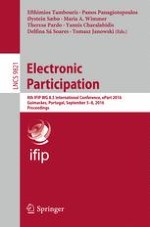2016 | Buch
Electronic Participation
8th IFIP WG 8.5 International Conference, ePart 2016, Guimarães, Portugal, September 5-8, 2016, Proceedings
herausgegeben von: Efthimios Tambouris, Panos Panagiotopoulos, Øystein Sæbø, Maria A. Wimmer, Theresa A. Pardo, Yannis Charalabidis, Delfina Sá Soares, Tomasz Janowski
Verlag: Springer International Publishing
Buchreihe : Lecture Notes in Computer Science
